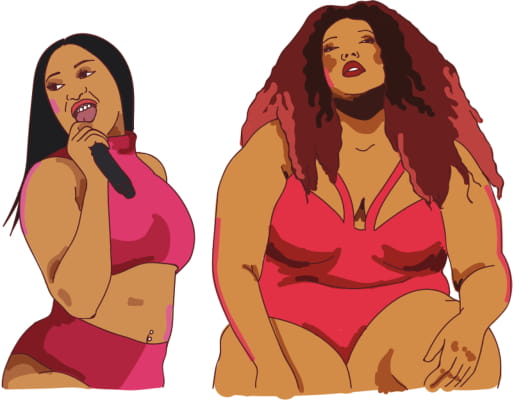Rappers Megan Thee Stallion and Lizzo pose. Female artists are often frowned upon due to their risqúe lyrics while males are able to do so without backlash. Illustration by Audrey Kennedy.
Many female rap artists receive backlash for risqué lyrics that promote their sexuality, while male artists are met with praise for doing the same thing.
The “Hot Girl Summer” social movement gained popularity in the summer of 2019 due in large part to rapper Megan Thee Stallion, who describes it as “women and men being unapologetically them, just having a good ass time, hyping up their friends, (and just) doing you.”
However, while the “Hot Girl Summer” movement has generally been embraced with open arms, the music it originated from has not. Female music artists like Megan Thee Stallion, Cardi B, Lizzo and others are wearing their sexuality
on their sleeves with lyrics that allow them to embrace and love their figures. In Megan Thee Stallion’s song “Hot Girl Summer”, she raps, “Look, college girl, but a freak on the weekend, eat that d— up even when I’m going vegan.”
While some women in the industry have accumulated a large following, they have also been met with backlash regarding their lyrics. When Jermaine Dupri, the founder of the record label So So Def, was asked who his favorite female rapper is during an interview with People TV, he was unable to provide an answer.
“The only reason why I can’t say is because I feel they’re all rapping about the same things,” Dupri said. “I don’t think they’re showing us who’s the best rapper. For me, it’s like strippers rapping.” Dupri’s hypocrisy is exemplified in his support for So So Def artist Bow Wow, who released a song in 2013 boasting about the fact that he has “P—- on his mind”.
Male artists like Future, NBA Youngboy and DaBaby are praised for their racy and often violent lyrics. NBA Youngboy’s song “Top Down” is a prime example, with violent and aggressive lyrics like, “B—h I’m aggressive, suck me up, I break yo’ f—-n’ neck.”
While listeners are often able to overlook the sexual or explicit lyrics featured in male artist’s music, female artists rarely receive the same treatment.
This double standard stems from the suppression of female sexuality that has been ingrained in American culture for so long. Through this music, women are reclaiming the sexuality they’ve had to hide for centuries. No matter how they choose to do it, it should be accepted.
“I don’t want to influence women to do something (risqué) – I want you to feel that empowerment, like you could do (something risqué),” rapper Cardi B. said. “A lot of women don’t do it because they don’t know how to, but a lot of women wish they could.”
Female artists often use their music to embrace their sexuality. On Lizzo’s song “Lingerie”, she sings, “These panties are see-through, I’m exposed, yeah. Treat you with my body, my eyes closed.” This is empowering because, for so long, women were forced to keep their sexuality concealed.
Listeners can make a conscious effort to support women artists by streaming their music and promoting them on social media. If the music is too provocative for some listeners, there’s an easy solution: don’t listen to it.
Female artists who promote body positivity should be respected and taken seriously. Women should be able to reclaim their bodies in a sexual context without receiving backlash from the music community.
